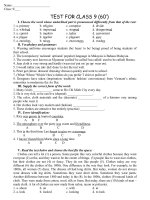Test unit 2 urbanization
Bạn đang xem bản rút gọn của tài liệu. Xem và tải ngay bản đầy đủ của tài liệu tại đây (149.82 KB, 8 trang )
TEST 1
ENGLISH GRADE 12
UNIT 2:URBANISATION
Mark the letter A, B, C, or D on your answer sheet to indicate the word that differs from
the other three in the position of stress in each of the following questions.
Question 1: A. inhabitant
Question 2: A. illustrate
B. industrialize
B. summarize
C. environment
C. employment
D. presentation
D. interesting
Mark the letter A, B, C, or D on your answer sheet to indicate the word whose underlined
part differs from the other three in pronunciation in each of the following questions.
Question 3: A. slum
Question 4: A. provoke
B. industrial
B. overload
C. rural
C. propose
D. fluctuate
D. progress
Mark the letter A, B, C, or D on your answer sheet to indicate the word(s) OPPOSITE in
meaning to the underlined word(s) in each of the following questions.
Question 5: “Don’t be such a pessimist. I’m sure you’ll soon get over it. Cheer up!”
A. activist
B. feminist
C. optimist
D. hoppyist
Question 6: I decided not to go to university, but watching all my friends go off and graduate
made me feel like I had missed the boat.
A. taken a chance
B. left a sinking ship C. arrived too early
D. gone on a
cruise
Mark the letter A, B, C, or D on your answer sheet to indicate the word CLOSEST in
meaning to the underlined word in each of the following questions.
Question 7: He was asked to account for his presence at the scene of crime.
A. complain
B. exchange
C. explain
D. arrange
Question 8: I could see the finish line and thought I was home and dry.
A. hopeless
B. hopeful
C. successful
D. unsuccessful
Mark the letter A, B, C, or D on your answer sheet to indicate the sentence that best
completes each of the following exchanges.
Question 9: Linda and Peter are talking about safe driving.
- Linda: "I think drink-driving should be severely punished."
- Peter: " ________. It may cause accidents or even deaths.”
A. I absolutely agree with you
B. You must be kidding
C. I don’t think so
D. I don’t understand what you mean
Question 10: - Fiona: "My first English test was not as good as I expected."
-Lan: " ______________."
A. Good Heavens
B. Never mind. Better job next time
C. That’s brilliant enough !
D. It’s okay. Don’t worry
Mark the letter A, B, adī C, or D on your answer sheet to indicate the correct answer to
each of the following questions.
Question 11: I first met her four years ago when we ______ at a middle school.
A. were studying
B. are studying
C. have been studying
D. studying
Question 12: I don’t like people who _______ other people’s kindness.
A. take advantage
B. take advantages of
C. take advantage of
D. take advantage in
Question 13: It is imperative that this letter _______ immediately.
A. were sent
B. sent
C. was sent
D. be sent
Question 14: _______ and poverty force people to engage in anti-social activities.
A. Employees
B. Employment
C. Unemployment
D. Jobs
Question 15: Traffic congestion has become a major issue, while schools and hospitals are
_________.
A. overloaded
B. overbearing
C. overdone
D. overdeveloped
Question 16: The government said that they didn’t have enough funds to deal with ______
medical care.
A. low-cost
B. high-cost
C. cost-high
D. cost-effective
Question 17: It is essential that every student _______ the exam before attending the course.
A. pass
B. passes
C. would pass
D. passed
Question 18: The doctor recommended __________.
A. that my father eat more fish and not drink wine
B. my father that eating more fish and not drinking wine
C. my father that to eat more fish and not to drink wine
D. that my father eating more fish and no drinking wine
Question 19: I can’t stand _________ people who are not tolerant of new ideas.
A. open-minded
B. narrow-minded
C. light-hearted
D. kind-hearted
Question 20: She bought the book _______ she had heard it was good.
A. due to
B. due to the fact that C. so
D. because of
Question 21: ________ Nancy is an honest person, I still wonder whether she’s telling the
truth about the incident.
A. In spite of
B. Because
C. Though
D. Despite
Question 22: Increasing _______ is accelerating the economic development of the area.
A. urbanize
B. urbanizing
C. urbanized
D. urbanization
Question 23: Trees won’t grow _______ there is enough water.
A. if
B. unless
C. when
D. as
Question 24: The law requires that everyone _______ his car checked at least once a year
A. has
B. have
C. must have
D. be having
Question 25: A large number of inventions and discoveries have been made _______
accident.
A. at
B. on
C. in
D. by
Read the following passage and mark the letter A, B, C, or D on your answer sheet to
indicate the correct word or phrase that best fits each of the numbered blanks from 26 to
30.
Urban development is having a direct impact on the weather in
many cities worldwide. It has been noticed that the difference (26)______
temperature is usually greater at night and the phenomenon occurs in
both winter and summer. Experts agree that this is due to urban
development, when open green spaces are replaced with asphalt roads
and tall brick or concrete buildings. These materials retain heat generated
by the Sun and release it through the night. In Atlanta, in the US, this has
even led to thunderstorms (27)______ occur in the morning rather than, as
is more common, in the afternoon.
Large cities around the world are adopting strategies to combat this
issue (28)______ it is not uncommon to find plants growing on top of roofs
or down the walls of large buildings. In Singapore, the government
has (29)______ to transform it into a "city within a garden" and, in 2006,
they held an international competition calling for entries to develop a
master plan to help bring this about. One outcome was the creation of 18
"Supertrees" – metal constructions resembling very tall trees. Each one is
a vertical freestanding garden and is (30) ______ to exotic plants and
ferns. They also contain solar panels used to light the trees at night and
also containers to collect rainwater, making them truly self-sufficient.
Question 26: A. on
B. with
C. in
D. out
Question 27: A. when
B. which
C. what
D. where
Question 28: A. or
B. for
C. and
D. but
Question 29: A. pledged
B. commited
C. confessed
D. required
Question 30: A. house
B. place
C. land
D. home
Read the following passage and mark the letter A, B, C, or D on your answer sheet to
indicate the correct answer to each of the questions from 31 to 35.
Overpopulation, the situation of having large numbers of people with
too few resources and too little space, is closely associated with poverty.
It can result from high population density, or from low amounts of
resources, or from both. Excessively high population densities put stress
on available resources. Only a certain number of people can be supported
on a given area of land, and that number depends on how much food
and other resources the land can provide. In countries where people live
primarily by means of simple farming, gardening, herding, hunting, and
gathering, even large areas of land can support only small numbers of
people because these labor - intensive subsistence activities produce only
small amounts of food.
In developed countries such as the United States, Japan and the
countries of Western Europe, overpopulation generally is not considered a
major cause of poverty. These countries produce large quantities of food
through mechanized farming, which depends on commercial fertilizers,
large - scale irrigation, and agricultural machinery. This form of production
provides enough food to support the high densities of people in
metropolitan areas.
A country’s level of poverty can depend greatly on its mix of
population density and agricultural productivity. Bangladesh, for example,
has one of the world's highest population densities, with 1,147 persons
per sq km. A large majority of the people of Bangladesh engage in low productivity manual farming, which contributes to the country's extremely
high level of poverty.
Question 31: Which of the following is given a definition in paragraph 1?
A. Poverty
B. Simple farming
C. Overpopulation
D. Population density
Question 32: What will suffer when there are excessively high population densities ?
A. Farming methods
B. Skilled labour
C. Land area
D. Available resources
Question 33: The phrase “that number” in paragraph 1 refers to the number of _______
A. densities
B. countries
C. people
D. resources
Question 34: In certain countries , large areas of land can only yield small amounts of food
because _______.
A. there is an abundance of resources
B. there is no shortage of skilled labor
C. there is lack of mechanization
D. there are small numbers of laborers
Question 35: Bangladesh is a country where the level of poverty depends greatly on ______.
A. population density in metropolitan areas
B. its population density only
C. its high agriculture productivity
D. both population density and agricultural productivity
Read the following passage and mark the letter A, B, C, or D on your answer sheet to
indicate the correct answer to each of the questions from 36 to 42.
Whales are the largest animals in the world, and the gentlest
creatures we know. Although the whale is very huge, it is not hindered at
all by its size when it is in the water. Whales have tails that end like
flippers. With just a gentle flick, it can propel itself forward. The skin of a
whale is so smooth that it does not create any friction that can slow the
whale down. A whale’s breathing hole is located on the top of its head, so
it can breathe without having to completely push its head out of the
water. Whales are protected from the cold seawater by body fat that is
called blubber.
Whales live in the ocean but, in terms of behaviours, they are more
similar to humans than fish. They live in family groups and they even
travel in groups when they have to migrate from cooler to warmer waters.
The young stay with their parents for as long as fifteen years. Whales are
known not to desert the ill or injured members; instead, they cradle them.
When whales are in danger, there are people who go to great lengths
to help them. One such case occurred in 1988, when three young whales
were trapped in the sea. It was close to winter and the sea had begun to
freeze over. Whales are mammals that require oxygen from the air, so the
frozen ice was a great danger to them. All they had then was a tiny hole
in the ice for them to breathe through. Volunteers from all over soon
turned up to help these creatures. They cut holes in the ice to provide
more breathing holes for the whales. These holes would also serve as
guides for the whales so that they could swim to warmer waters.
Question 36: Which of the following best describes the main idea of the passage ?
A. Successful attempts to rescue whales all over the world.
B. Some remarkable similarities of whales to humans.
C. Whales as the largest, gentlest but vulnerable creatures.
D. Whales as the only animals to live in warm water.
Question 37: Whales can move easily in water thanks to their
A. tail and blubber
B. size and head
C. tail and skin
D. skin and head
.
Question 38: Where is the whale’s breathing hole located ?
A. On its head
B. On its back
C. On its face
D. On its tail
Question 39: According to the paragraph 2, the author mentions all of the following to show
that whales “are more similar to humans” EXCEPT _________.
A. they do not desert the ill or injured members
B. they do not migrate from cooler to warmer waters
C. they live in family groups and travel in groups
D. the young stay with their parents for almost fifteen years
Question 40: The word “tiny” in paragraph 3 probably means ______
A. very small
B. very deep
C. very fat
D. very ugly
Question 41: The word “they” in paragraph 3 refers to _______ .
A. guides
B. holes
C. the whales
D. warmer waters
Question 42: According to the passage, why was the frozen ice on the sea surface a danger to
whales ?
A. Because they couldn’t swim in icy cold water
B. Because they couldn’t eat when the weather was too cold
C. Because whales couldn’t breathe without sufficient oxygen
D. Because the water was too cold for them as they were warm-blooded
Mark the letter A, B, C, or D on your answer sheet to indicate the sentence that best
combines each pair of sentences in the following questions.
Question 43: I didn’t pay attention to the teacher. I failed to understand the lesson
A. Although I paid attention to the teacher, I failed to understand the lesson.
B. I would have understood the lesson if I had failed to pay attention to the teacher.
C. I would have understood the lesson if I had paid attention to the teacher.
D. Unless I failed to understand the lesson, I would pay attention to the teacher.
Question 44: Smartphones are becoming reasonably priced. New applications make them
more appealing.
A. Appealing though smartphones are with new applications, they are becoming less
affordably priced
B. Whatever new applications smartphones have, they are becooming more appealing
with reasonable prices
C. No matter how reasonable the prices of smartphones are, they are not so appealing
with new applications
D. Not only are smartphones become more affordable but, with new applications, they
are also more appealing
Mark the letter A, B, C, or D on your answer sheet to indicate the underlined part that
needs correction in each of the following questions.
Question 45: It is the recommendation of the consultants that the patient treat under medical
A
B
C
D
supervision
Question 46: Building thousands of year ago, the ancient palace is popular with modern
A
B
C
D
tourists
Question 47: A new school with more than 50 classrooms have just been built in our local
A
B
C
D
area.
Mark the letter A, B, C, or D on your answer sheet to indicate the sentence that is closest in
meaning to each of the following questions.
Question 48: It’s important to get vitamin D through sunlight and the foods you eat.
A. You mustn’t get vitamin D through sunlight and the foods you eat.
B. You’d rather get vitamin D through sunlight and the foods you eat.
C. You needn’t get vitamin D through sunlight and the foods you eat.
D. You should get vitamin D through sunlight and the foods you eat.
Question 49: I haven’t seen her since we left school.
A. It’s ages since I last left school.
B. The last time I saw her was when we were at school.
C. I didn’t see her when we left school.
D. The last time I saw her was when we left school.
Question 50: It was wrong of you to leave the class without asking for your teacher’s
permission.
A. You shouldn’t have left the class without asking for your teacher’s permission.
B. You mustn’t leave the class without asking for your teacher’s permission.
C. You needn’t leave the class without asking for your teacher’s permission.
D. You needn’t ask for your teacher’s permission when you want to leave the class.
ĐÁP ÁN THAM KHẢO
1. D
11. A
21. C
31. C
41. C
2. C
12. C
22. D
32. D
42. C
3. C
13. B
23. B
33. C
43. C
45. treat be treated
46. Building Built
47. have has
4. D
14. C
24. B
34. C
44. D
5. C
15. A
25. D
35. D
45. C
6. A
16. B
26. C
36. D
46. A
7. C
17. A
27. B
37. C
47. B
8. C
18. A
28. C
38. A
48. D
9. A
19. B
29. A
39. B
49. D
10. B
20. B
30. D
40. A
50. B

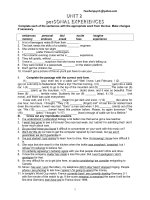
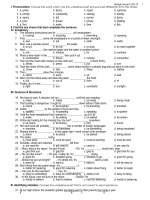

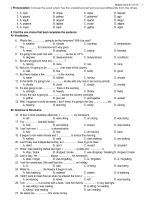
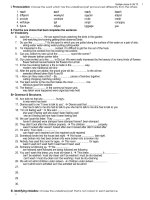
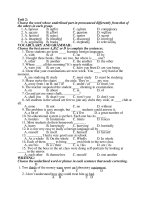
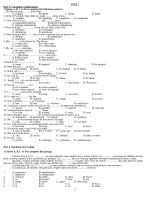
![test unit 6 [2]](https://media.store123doc.com/images/document/13/pt/yz/medium_yzq1372518559.jpg)
